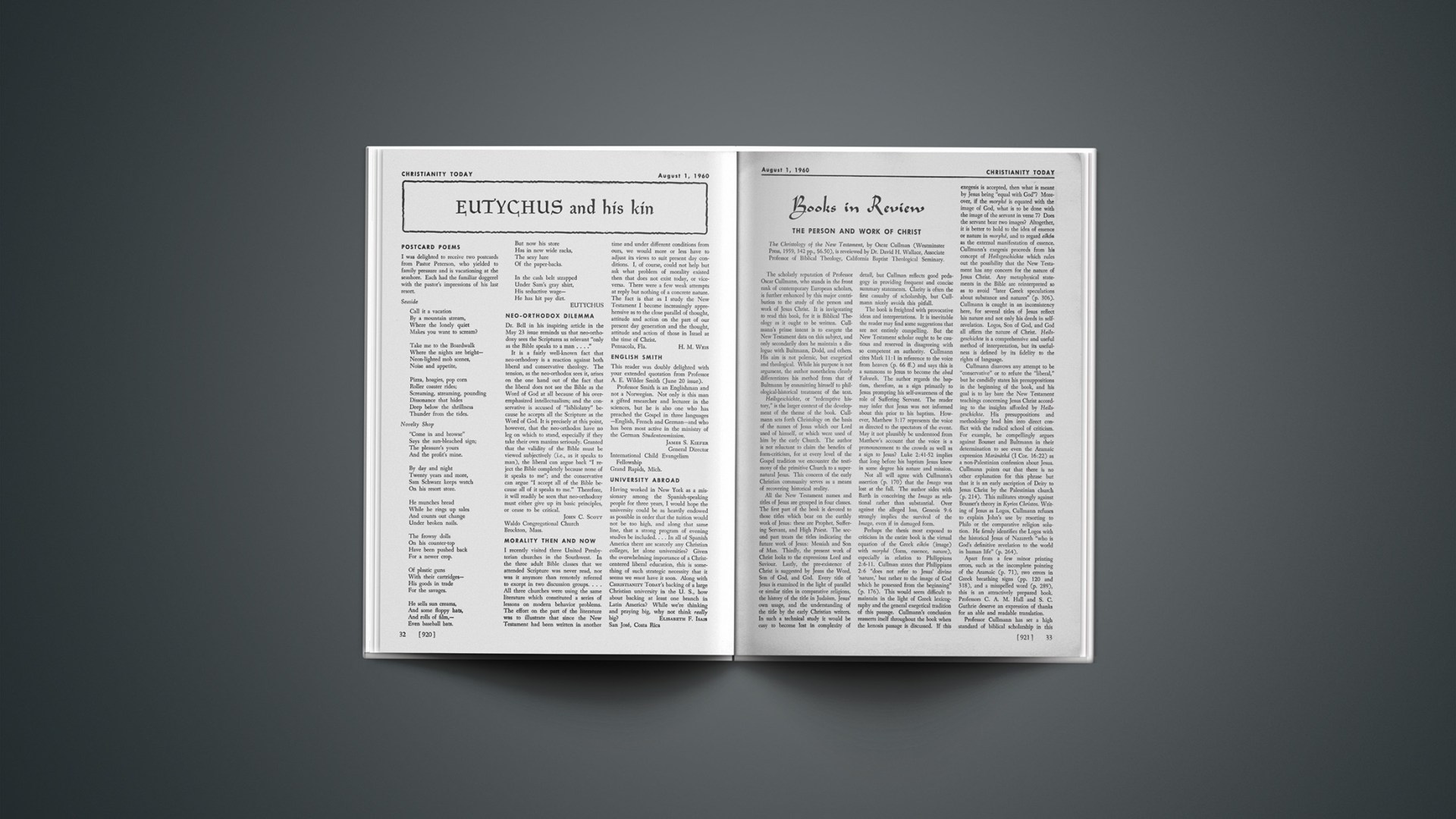POSTCARD POEMS
I was delighted to receive two postcards from Pastor Peterson, who yielded to family pressure and is vacationing at the seashore. Each had the familiar doggerel with the pastor’s impressions of his last resort.
Seaside
Call it a vacation
By a mountain stream,
Where the lonely quiet
Makes you want to scream?
Take me to the Boardwalk
Where the nights are bright—
Neon-lighted mob scenes,
Noise and appetite,
Pizza, hoagies, pop corn
Roller coaster rides;
Screaming, streaming, pounding
Dissonance that hides
Deep below the shrillness
Thunder from the tides.
Novelty Shop
“Come in and browse”
Says the sun-bleached sign;
The pleasure’s yours
And the profit’s mine.
By day and night
Twenty years and more,
Sam Schwarz keeps watch
On his resort store.
He munches bread
While he rings up sales
And counts out change
Under broken nails.
The frowsy dolls
On his counter-top
Have been pushed back
For a newer crop.
Of plastic guns
With their cartridges—
His goods in trade
For the savages.
He sells sun creams,
And some floppy hats,
And rolls of film,—
Even baseball bats.
But now his store
Has in new wide racks,
The sexy lure
Of the paper-backs.
In the cash belt strapped
Under Sam’s gray shirt,
His seductive wage—
He has hit pay dirt.
EUTYCHUS
NEO-ORTHODOX DILEMMA
Dr. Bell in his inspiring article in the May 23 issue reminds us that neo-orthodoxy sees the Scriptures as relevant “only as the Bible speaks to a man.…”
It is a fairly well-known fact that neo-orthodoxy is a reaction against both liberal and conservative theology. The tension, as the neo-orthodox sees it, arises on the one hand out of the fact that the liberal does not see the Bible as the Word of God at all because of his overemphasized intellectualism; and the conservative is accused of “bibliolatry” because he accepts all the Scripture as the Word of God. It is precisely at this point, however, that the neo-orthodox have no leg on which to stand, especially if they take their own maxims seriously. Granted that the validity of the Bible must be viewed subjectively (i.e., as it speaks to man), the liberal can argue back “I reject the Bible completely because none of it speaks to me”; and the conservative can argue “I accept all of the Bible because all of it speaks to me.” Therefore, it will readily be seen that neo-orthodoxy must either give up its basic principles, or cease to be critical.
JOHN C. SCOTT
Waldo Congregational Church
Brockton, Mass.
MORALITY THEN AND NOW
I recently visited three United Presbyterian churches in the Southwest. In the three adult Bible classes that we attended Scripture was never read, nor was it anymore than remotely referred to except in two discussion groups.… All three churches were using the same literature which constituted a series of lessons on modern behavior problems. The effort on the part of the literature was to illustrate that since the New Testament had been written in another time and under different conditions from ours, we would more or less have to adjust its views to suit present day conditions. I, of course, could not help but ask what problem of morality existed then that does not exist today, or vice-versa. There were a few weak attempts at reply but nothing of a concrete nature. The fact is that as I study the New Testament I become increasingly apprehensive as to the close parallel of thought, attitude and action on the part of our present day generation and the thought, attitude and action of those in Israel at the time of Christ.
H. M. WEIS
Pensacola, Fla.
ENGLISH SMITH
This reader was doubly delighted with your extended quotation from Professor A. E. Wilder Smith (June 20 issue).
Professor Smith is an Englishman and not a Norwegian. Not only is this man a gifted researcher and lecturer in the sciences, but he is also one who has preached the Gospel in three languages—English, French and German—and who has been most active in the ministry of the German Studentenmission.
JAMES S. KIEFER
General Director
International Child Evangelism Fellowship
Grand Rapids, Mich.
UNIVERSITY ABROAD
Having worked in New York as a missionary among the Spanish-speaking people for three years, I would hope the university could be as heavily endowed as possible in order that the tuition would not be too high, and along that same line, that a strong program of evening studies be included.… In all of Spanish America there are scarcely any Christian colleges, let alone universities? Given the overwhelming importance of a Christ-centered liberal education, this is something of such strategic necessity that it seems we must have it soon. Along with CHRISTIANITY TODAY’S backing of a large Christian university in the U. S., how about backing at least one branch in Latin America? While we’re thinking and praying big, why not think really big?
ELISABETH F. ISAIS
San José, Costa Rica










